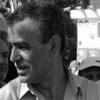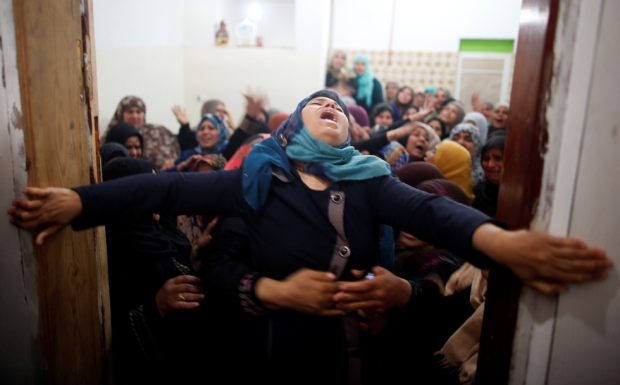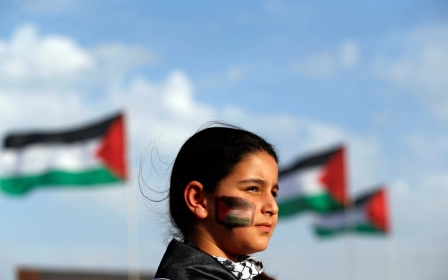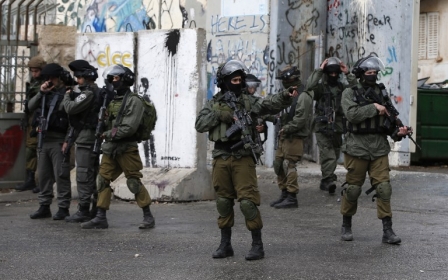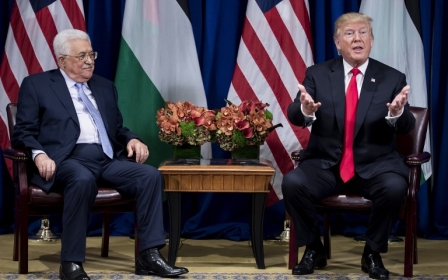Gaza challenges its destiny
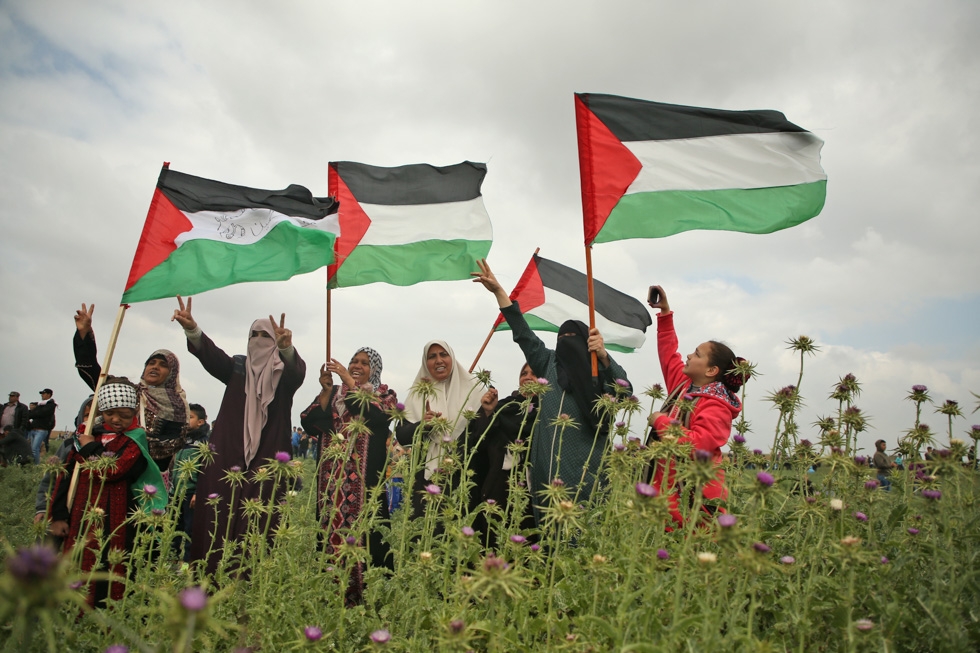
The Great Return March has established a very important, though exceptionally simply point, namely that the conflict in Palestine is between truth and falsehood, between the victim and the aggressor.
Between the brutality of an occupation that seeks to "protect what it stole," and the bravery of the Palestinian who seeks to win a normal life and endeavour to "regain a stolen property".
The popular march has conveyed the tale of the people of historic Palestine, the people whose land was occupied, the people who were banished from their homeland, the people who are demanding freedom and return.
On the other side, Israel's narrative regards "the return" as an attack on it and on its territories, and claims it has the "right to defend" the sanctity of its borders. The two narratives are not equal, just as the claim of the criminal and the claim of the victim are not equal. The offender has an interest in concealing the truth and falsifying it whereas the victim's interest lies in disclosing the truth and making it known to the people.
The Great Return March has established a very important point, namely that the conflict in Palestine is between Truth and Falsehood, between the victim and the aggressor
Israel fears the moral power of the Palestinian issue. It fears the disclosure of truth and the collapse of its narrative that is founded on lying and deception. Perhaps what concerns Israel most is the sight of tens of thousands of refugees bearing the names of their villages and towns in a peaceful march.
Israel has established a reliable network of claims to counter the Palestinian narration and respond to the Palestinian demands when they come from representatives of the masses and armed resistance groups.
However, it has never experienced the popular march of hundreds of thousands of people. This is a scene that cannot simply be refuted or denied with a stroke of a pen. As usual, when Israel panics it opens fire, and then it goes searching for justifications.
In Israeli tradition, justifications are no less important than opening fire. Israel already has an arsenal of pretexts to justify all its crimes no matter how brutal and how dirty.
The Great Return March, which started out of Gaza, has been entirely peaceful. This is how it was planned, and this is how it has been. Not a single Israeli soldier was threatened, and no one can claim that the Israeli troops opened fire in self-defence or defence of others. The only rationale for opening fire has been “the defence” of occupation and the usurpation of the land and the homeland from the Palestinians. Such is the logic of the thief who “defends” his right to keep what he stole and robbed.
'Popular uprisings erupt when people lose hope'
Furthermore, no one claims that the soldiers opened fire by mistake. There has been an explicit acknowledgement that the killing was deliberate, predetermined and targeted at those Israel calls "provocateurs". This is not predetermined and deliberate murder. When such action is taken by an official body and by a regular army, it is to be regarded as an execution. But an execution for what? For "inciting" people to demonstrate peacefully?
Official Israel has realised that it indicts itself by claiming it was killing "provocateurs," so it resorted to inventing a new story, namely that it has had indications that the resistance was exploiting peaceful demonstrations in order to carry out military operations. After making this claim in an official army communique, Israel killed four Palestinian demonstrators and claimed they were "terrorists".
This was followed by an Israeli claim that whoever was killed by the army was one of those Israel describes as "saboteurs" and even "fighters". In this way, Israel laid the foundation for its narrative that uses the claim of "terrorism," which it exploits to justify the perpetration of more massacres.
The only rationale for opening fire has been "the defence" of the usurpation of the land and the homeland from the Palestinians. Such is the logic of the thief who "defends" his right to keep what he stole and robbed.
It is important for us to point out that apart from a tiny minority of radical lefties, Israel has stood by its soldiers and supported them as they murdered unarmed Palestinians. This includes the government, the army leadership, political leaders in both the ruling coalition and the opposition, and the press, the latter which has behaved like a royal mouthpiece and a media arm dedicated voluntarily to the service of the army.
The criminal violence on display from Israel that sought to repress the Great Return March is deliberate and has been pre-planned to achieve a specific objective. It aims to "burn into the consciousness" of the Palestinians and create a state of deterrence among them to prevent what Israel fears most, namely a comprehensive and extensive popular struggle and popular rallies that would penetrate the borders and lay siege to the settlements.
One of the paradoxes of popular uprisings is that they often erupt when people lose hope and when political forces meet a dead end. This is when the masses, who suffer a crisis in their living conditions, cease to rely on these traditional political forces as their representatives and take to the streets to speak their word and make their cry.
Such uprisings revive hope, awaken a dream and explode in the face of a reality that can no longer be tolerated. In the Great Return March, which started in Gaza, our people write history and pave the way for return, freedom and independence. "The rally of the Popular March" restores respect to the peaceful popular movement, which only years ago rocked the thrones of Arab rulers and that more recently forced Israel to retract from setting up electronic gates at the entrances to Al-Aqsa Mosque in Jerusalem.
A new phase of the Palestinian struggle
Following the obstruction of the negotiations pursued by Palestine President Mahmoud Abbas - also known as Abu Mazin - and the Palestine National Authority, and given the deadend met by the armed resistance led by Hamas, the peaceful popular struggle has earned the consensus of the Palestinian elites and masses alike.
As such, the Great Return March represents a new beginning that heralds a new phase of the Palestinian struggle, one that could gain the support of everyone and that could become the cornerstone in the process of reconciliation for which the Palestinian people long.
The Great Return March has accomplished significant success in some important ways.
It has smashed the conspiracy of silence toward the siege imposed on Gaza, a blockade that has turned the lives of two million Palestinians into a life of hell that no human being can bear. The march has illustrated that the Palestinian people will not tolerate this siege any more and that the humanitarian disaster in the Gaza Strip will lead to an explosion, and not far off.
The march also restored respect to the right of return and to UN Resolution 194 and motivated people to work for the actual return even if the road is long. It has proven to all those concerned, here and there, that the rights of the refugees cannot be scrapped.
One of the most important achievements of the march has been the national unity accomplished while preparing for it and while executing it. The impact of such unity in the real world is much more significant than the mere talk about it.
This has sent a clear message to the Palestinian leadership that the people want to end the division and that if reconciliation is not fulfilled the people will seek alternatives that will marginalise those who are opposed to unity.
Such uprisings revive hope, awaken a dream and explode in the face of a reality that can no longer be tolerated.
Thank you, Gaza, for having sent a national unity message in the era of division. Thank you, Gaza, because you have transformed the national struggle into reality after it was squeezed and cornered into mere talk. Thank you, Gaza.
And this gratitude means that we should all move and stand together with mighty Gaza in a struggle that has a clear objective: correcting the historical wrong that has been inflicted upon the people of Palestine.
- Jamal Zahalka is a Palestinian citizen of Israel who serves as a member of the Knesset leading the Balad Party.
The views expressed in this article belong to the author and do not necessarily reflect the editorial policy of Middle East Eye.
Photo: Palestinian women wave Palestinian flags during a protest near the border with Israel in the Gaza strip commemorating Land Day on March 30, 2018 (AFP)
Middle East Eye propose une couverture et une analyse indépendantes et incomparables du Moyen-Orient, de l’Afrique du Nord et d’autres régions du monde. Pour en savoir plus sur la reprise de ce contenu et les frais qui s’appliquent, veuillez remplir ce formulaire [en anglais]. Pour en savoir plus sur MEE, cliquez ici [en anglais].


